REPTILES |
|
Place cursor on each photo to have text, use thumbnails to enlarge
photos
|
|
| |
| Chinese Gecko Gekko chinensis |
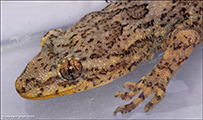
|
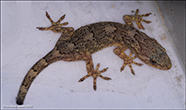 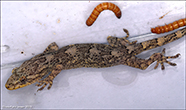 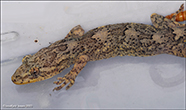 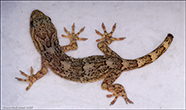
|
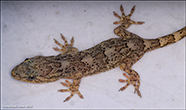
|
| Imported to the Faroe Islands with goods from Asia in October 2023 |
|
| Green iguana Iguana iguana |
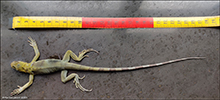 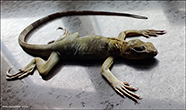 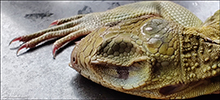
|
| Tórshavn 24.05.2023 |
| On this date, R. L. Hansen found this recently dead Green iguana in a container that had just arrived in the Faroe Islands. |
|
| Italian wall lizard Podarcis sicula |
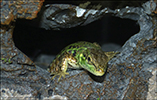 |
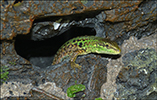 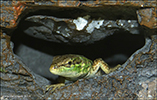 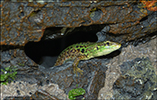 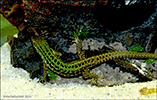
|
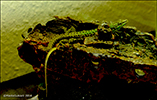 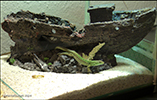
|
All sorts of creepy crawlers are unintentionally imported with goods to the Faroe Islands, and this lizard, which Malan Ellingsgaard found 14.11.2014 in a box with cut bunches of parsley, is just one example of many. |
| Podarcis sicula lives in Southern Europe. |
|
| Alive Bufo bufo found in Miðvágur, Vágar |
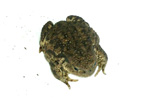 |
13. August 2011 Silvia Johansen found this alive Bufo bufo in Miðvágur, Vágar. This is the fourth observation in Faroe Islands. It is most likely thrown out or escaped from captivity. |
|
| Bufo bufo found dead in Húsavík, Sandoy |
 
|
| Marna Skylv Sørensen found this dead Bufo bufo in Húsavík on Sandoy 05.10.2010. I wonder, how this amphibian ended up in Húsavík? |
|
| Common frog Rana temporaria |
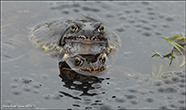 |
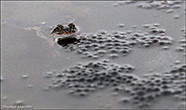 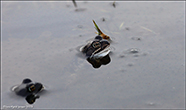 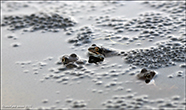
|
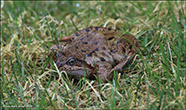
|
| At least 150,000 frog eggs were in a small pond at Nólsoy 04/05/2023 |
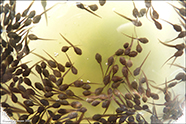 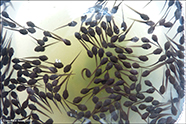 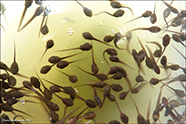
|
| Tadpoles 22.04.2023 |
|
| THE FROGS IN NÓLSOY HAVE BRED AGAIN IN 2009 |
Rana temporaria have established themselves as a wild population in Nólsoy |
|
| In 2008 tadpoles were seen for the first time in a small village pond at the location Norðri á Boða in Nólsoy. |
| 25. March 2009 I found several thousand eggs from Rana temporaria in the same pond. I brought 49 eggs home to my kitchen and put them in a glass, and 29. March there were 47 tadpoles in the glass - only 2 eggs were unfertilized. |
| I would never have believed, that Rana temporaria could live in the Faroese nature, but this must be the best proof. |
| In 2008 a frog was seen at the location of Fjallavatn in Vágoy. This frog was probably released in the nature by a man from Sørvági, who earlier got some tadpoles from Marnar á Skúr in Nólsoy. |
I know of at least 4 other frogs Bufo bufo, that have entered the Faroe Islands, but I have not heard about any of them breeding. |
Read more about the frogs in Nólsoy below theese photographs!
|
Frogs have bred in Nólsoy, Faroe Islands, in 2004 |
Some
years ago people in the small village of Nólsoy noticed frogs moving
around in the village. |
| 2002: In
2002 the frogs laid eggs, but they were not fertilized. |
| 2003: In 2003 there
were no eggs. |
| 2004: In the beginning of May 2004 there were an unbelievable amount of
fertilized eggs. Since then several hundreds of eggs have developed into
tadpoles both indoor and outdoor in bowls and tubs in Marnar’s garden.
|
| Marnar á Skúr – a local personality –
caught as many as he could, where after he placed them in a cage with a
small, but deep pool in his garden. At the beginning the frogs were
quite small, but since then they have grown a lot. Some of them
measure app. 8 cm. in length. Some of them are quite fair in colour and
some are dark, but still I believe they all belong to Rana temporaria.
|
| 2005: Even if May had winter temperatures,
the frogs on Nólsoy laid eggs again in the middle of the month. Marnar
á Skúr took the eggs indoors, and had several hundred tadpoles in
bowls and tubs. All became females - I did not see a single male.
|
| Marnar has 3 females, so there is a possibility that the two others
will breed as well… |
| A big amount of the young frogs from last summer have survived the
winter and seem to be doing fine. |
| Rana
temporaria exists from
Mid-europe to the North cap and over to the Ural Mountains. |
|
Copyright ©Jens-Kjeld Jensen
All
Rights Reserved |
|